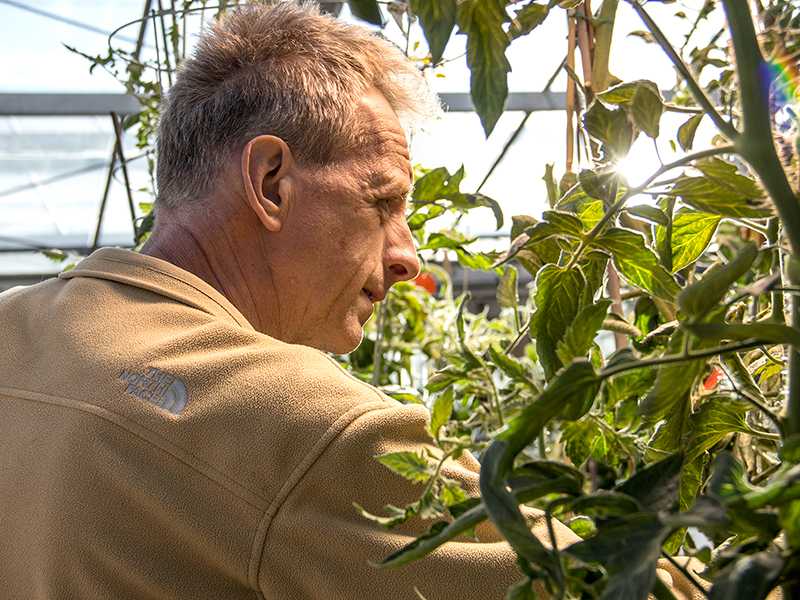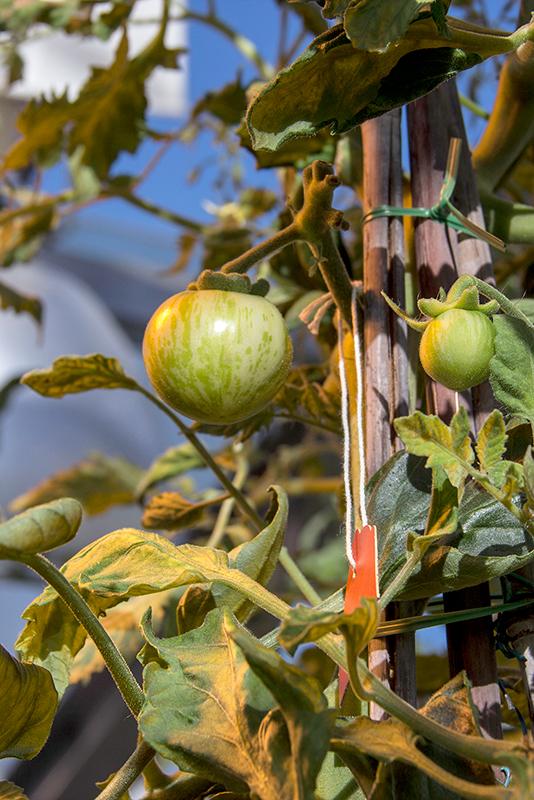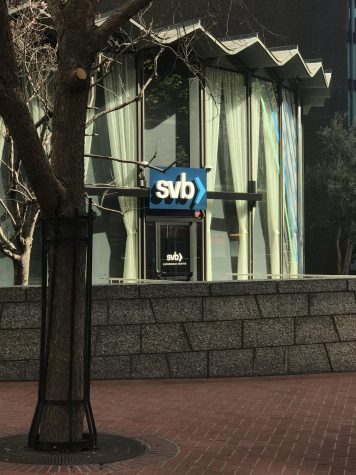Sunol farmer finds success in organic tomato industry
April 10, 2014
Fred Hempel stands amongst a row of his subjects, leaning in with a pair of stainless steel tweezers, carefully readjusting the reproduction of life. His job is to splice lineage and create anew using a touch of engineering and a deep understanding of biology pertaining to his delicate duty.
Hempel is his name, and tomato breeding is his game.
He is a tall man, with a rich voice and bright blue eyes. He bears hardened, calloused hands that are steady by trade. Weathering begins to show at the creases of his smile and spreads to his eyes, a testament to the years he’s spent devoted to his field. He employs an unreserved demeanor with jumbled elegance, and is well versed with a breadth of knowledge in scientific genetics.
After more than a decade of breeding and experimentation, Hempel exposes new shades of flesh with one-of-a-kind flavors at his farm Baia Nicchia in Sunol, Calif. These tomato creations, which come in an array of hues: pinks, greens, and yellows, with intriguing markings, are at the forefront of a food revolution in America. There is a growing desire for local foods, sustainable foods that tell a story at the dinner table.
Hempel aims to be the latest and greatest in the world of tomatoes, and in a market that produces over 13 million metric tons of these little vegetables in the U.S. alone, according to Food and Agriculture Organization of the United Nation’s 2012 report, they’ve got to be pretty special.
His product has proven to be desirable to farmer’s market regulars, Michelin Star chefs, and national seed companies, with an increase in demand coming in higher each year.
These handcrafted tomatoes and their seeds come with a higher price tag than what tomatoes usually sell for at the grocery store ($4 a pint at the farmer’s markets), but Hempel assures, “the flavor is comparable to the best cherry tomatoes out there.”

Hempel, who has a Ph.D. in plant biology from the University of California, Berkeley, is a specialist in crossbreeding and hybridizing artisan tomatoes, and has been doing so since 2001.
With an ear to the soil, and a background in biotechnology, he has managed to hit a sweet spot in the nation’s recent move toward purchasing organically grown, local produce. He owns a six-acre farm in Sunol, which allows him to produce and sell over 30 different varieties of his special tomatoes.
Changes in technology for tomato breeding
How exactly one would breed a tomato plant is not a mystery, however, in the last century a rise in global demand for improvement and quality standards in fruits and vegetables has lead to a significant impact on the breeding of tomatoes, according to The European Journal of Plant Science and Biotechnology.
Although a percentage of tomato breeding is performed in laboratories and research centers, this is not necessarily cost effective for a small farmer, according to Hempel, who rents a greenhouse near the UC Berkeley campus, which is about a 45-minute drive from his farm and home in Sunol. This greenhouse acts as a controlled environment with a longer season, allowing him to squeeze in several more crosses a year.
Hempel monitors the growth of each of his tomatoes on a weekly basis, and after about four trips to his greenhouse, he pulls the ripe fruit and studies the result. Hempel is able to tell which varieties did or did not do well depending on the fruit itself.
On one singular tomato plant, Hempel can create assorted varieties of tomatoes, all hanging from the same stalky green stem like an array of different colored ornaments.
An attention to detail leads to recognition by distributors
This close attention to detail has caught the interest of Johnny’s Selected Seeds, a national seed distributor—one who appreciates the “noticeably different taste” as compared with other small-fruited, striped tomatoes on the market, according to Andrew Mefferd, senior product technician at Johnny’s Selected Seeds.
According to Mefferd, Johnny’s Selected Seeds was established alongside a “back to the land movement,” amongst farmers four decades ago. The founder realized that at the time, a lack of variety and flavor amongst seed availability refortify the food industry at farmers markets and local CSA’s.
Hempel and Johnny’s Selected Seeds recently discussed the finishing touches on a contract, which both parties are anxious to begin next season. This comes after a two-year long honeymoon period between both sellers, and a promise from Hempel to continue producing new varieties, with the same distinct flavors, and a greater tolerance to common diseases.
In the coming years, Hempel hopes to turn out at least 15 new varieties for the company —which Johnny’s Selected Seeds will have exclusive first rights to sell on their website. And, Mefferd explains that they are in no rush, as breeding tomatoes needs to be a slow and careful process.
“Fred has already spent at least a decade working on this stuff, and he comes up with phenomenal product,” explains Mefferd.
















